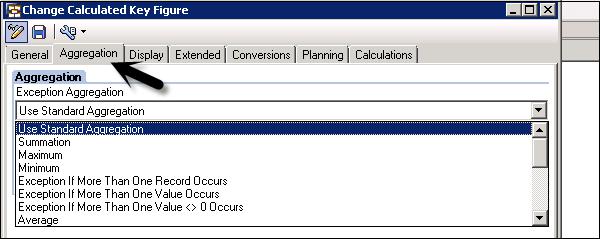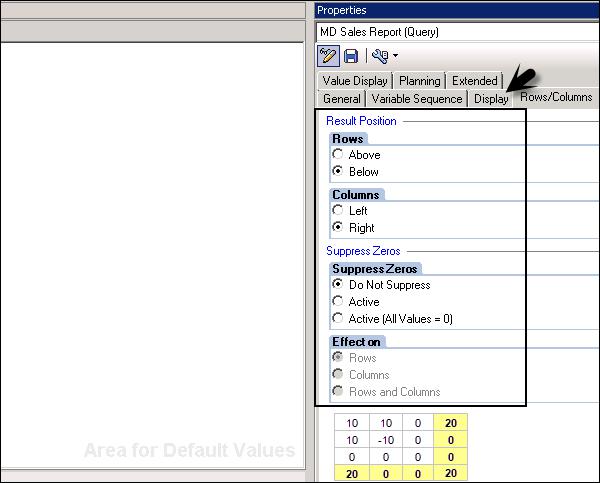SAP BEx - Query Designer Features
In this chapter, we will discuss the various features of the BEx Query Designer and understand its functions. We will also learn the different Query Components in detail. In addition, we will learn how to set up the Query Properties and the various Properties of the Query Components.
Business Explorer – Different Query Components
There are many objects in the Query Designer that can be reused at a global level. When objects are defined, it can be used in all the queries in a BW System. When these reusable objects are changed, these changes are applied in all the queries where it is used
The following object types can be created for reuse −
- Variables
- Restricted Key Figures
- Calculate Key Figures
To see the where the objects are used, you can select the Where Used List in the context menu.

To check the details of an object, go to the context menu and click on the Display button. It shows you the following information −
- Technical name
- Identifier
- Last changed by
- Date/Time

As mentioned, various objects can be reused in queries at global level.
Variable
In a Query Designer, you can define Variables to pass the value at run time. They can be used in web applications and other queries as a placeholder. To define Variables for any of the objects in query, you must open the Variable Editor.
You can open the Variable editor by clicking on the below option in the Query Designer. This option is available in the Query Properties of all the components where you can pass constant values.

You can also click on the drop down button and can access different options to create/edit variables.

The following fields are available −
Entry of Variables − Using this field, you can use this dialog to select a variable.
New Variable − You can use this option to create a new variable in the BEx query.
Change Variable − You can select a variable and click on the Change Variable button to change the value of the variable.
Remove − This option can be used to remove a variable from the list.
When you select New Variable/Change Variable, the following dialog box opens −

Restricted Key Figures
A Restricted Key Figure is defined as a key figure which can be used to restrict the values in a query based on the characteristics.
To define a new Restricted Key figure, navigate to Restricted Key figure folder → Context Menu and New Restricted Key Figure.

This will create a New Restricted Key Figure and the properties for the restricted key figure are displayed in the Properties screen area.

Define the technical name and description and click on the save button to save the key figure. To edit the restricted key figure, click on the Edit button or double click on the name in the hierarchical structure.
In the detailed view, you can see the directory of all objects available in the InfoProvider and on the right side you have an empty field to define the key figure.
Calculated Key Figure
You can also calculate the key figures in InfoProvider by using some formulas. Calculated key figure can be based on other key figures, restricted key figures or pre-calculated key figures.
To define a new calculated key figure, right click on the Key figure folder → New.

This will add the Calculated Key figure in the hierarchical structure and properties for the calculated key figure are displayed in the Properties screen area.
To define the calculation formula for the key figure, double click on the Calculate Key Figure. You have an option to define the Calculated Key figures in the General Tab.
Drag any other key figure and Operator from the Operators section. You have different Operators available under this section.

You can also define Aggregation for new Calculated Key figures.

The following function types are available under the General tab to define the calculation for the New Calculated Key Figures −
- Basic Functions
- Percentage Functions
- Data Functions
- Mathematical Functions
- Trigonometric Functions
- Boolean Operators
Once you define the formula, click on the OK button as shown in following screenshot.

You can also go to the Properties tab of the Calculated Key figure. You can define different properties for a new key figure and can also edit an existing key figure −
- Description
- Display
- Number format
- Currency translation
- Local calculations
- Aggregation behavior

Business Explorer – Setting Query Properties
You can access the query properties by selecting the icon as shown in the following screenshot.

The following tabs are available under the Query Properties −
General Tab − You can enter the Description, Technical Name, InfoProvider and the Key Date along with the Last Changed By details under the General tab.

Variable Sequence Tab − This tab consists of variables listed in the query. You can also arrange the Variable sequence defined in the query.

Display Tab − You have Display options and document links inside the Display tab. Under the Display Option, you can adjust formatting after Refreshing, Scaling Factor, or Hide Repeated Key Figures.
You can create a document link for Metadata, Master Data and InfoProvider for a query.

Rows/Column Tab − This is used to define where results are displayed for a query.
Rows − Above or Below
Column − Left or Right
Suppress Zeros − This option can be used to specify whether columns or rows containing zeros are to be displayed or not.
Effect on − This field can be used to specify whether suppression of zeros should be applied to both rows/columns or only to rows or columns.

Value Display Tab − This tab is used to display the +/- value in the query and zero value display.

Planning Tab − You can define if a query should start in the change mode or the display mode.
For the queries that are not input ready, the Start Query in the Change Mode checkbox is always inactive and cannot be changed. When there is input ready queries, the check box is active.

Calculate Inverse Formulas − Using this option, Inverse formulas are used to recalculate input-ready formulas in planning the applications.

Business Explorer – Properties of Query Components
In the Business Explorer, you can define properties for each query component. Property dialog can be opened by clicking on the component in a hierarchical structure. You can define custom settings for each field or can also use default values.
The following component properties can be set in the BEx Query Designer −
- Characteristic Properties
- Properties of Characteristic Restrictions and Default Values
- Attribute Properties
- Selection/Formula/Cell Properties
- Structure Properties
- Filter Properties
- Variable Properties
- Condition Properties
- Exception Properties
- Row/Column Properties
In the Query Designer, you can derive properties of each component from the other object or can also set its value. You can also see the object name and can derive properties from the following objects −
The selection can derive properties from −
- Key figure in InfoProvider
- Restricted key figure
- Calculated Key Figure
The characteristics in the reusable filter can derive properties from the characteristics in the InfoProvider.
The restricted key figure can derive properties from −
- Key figure in InfoProvider
- Restricted key figure
- Calculated Key Figure
With this, we conclude the most commonly-used Properties of the Query Components.






















